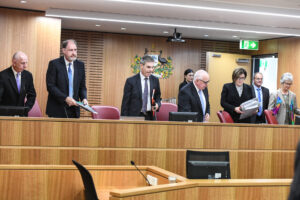This week the election campaign has turned to discussion about the increase to the minimum wage, with suggestions that an increase either in line with the curent rate of inflation of 5.1% or marginally above it (such as the ACTU’s proposal of a 5.5% increase) would bring about a return to 1970s style wage sprials.
Labour market policy director, Greg Jericho, in his column in Guardian Australia, however notes that wages should grow faster than inflation, and so long as real wages are not outpacing productivity growth then such rises are not exerting any inflationary pressure. He also shows that given the recent estimates for inflation by the Reserve Bank, a 5.1% increase would not be enough to prevent the minimum wage falling in real terms over the next financial year.
The problem is not that wages have been fuelling inflation, but that for the past 20 years real wages have risen slower than productivity.
We need to change the debate from a reflex that assumes low wages is the ideal to realising that given workers are the economy they should be rewarded fairly for their efforts and improvements in productivity.
You cannot say the economy is healthy if real wages are falling, and most certainly not if the lowest paid in Australia are seeing their living standards decline.

You might also like
Productivity is often mistaken for wages. What does it really mean? How does it work?
Australia’s productivity growth has reverted to the same stagnant pattern as before the pandemic, according to the Productivity Commission’s latest quarterly report. Productivity is complex and often misunderstood in media and policy debates. So before we read too much into this latest data, here are six key things to understand about productivity. 1. It’s about quantities,
Closing Loopholes Protections, Including Right to Disconnect, Come Into Effect 26 August
New labour rights coming into effect on 26 August, including the ‘Right to Disconnect’.
The continuing irrelevance of minimum wages to future inflation
Minimum and award wages should grow by 5 to 9 per cent this year


